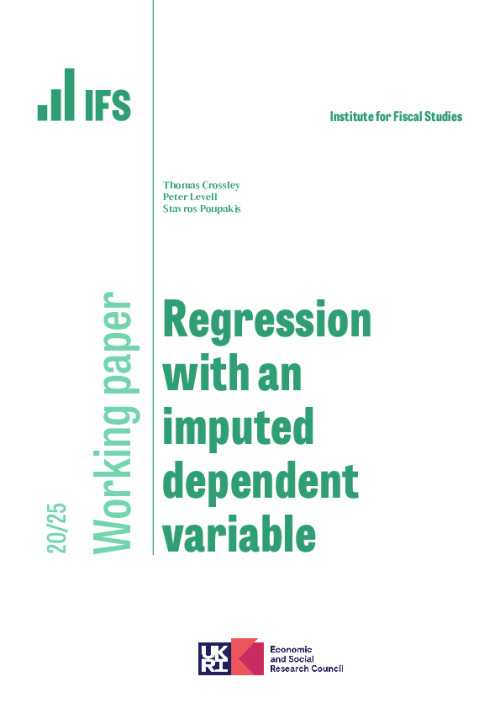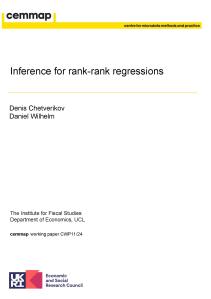Downloads

WP202025-Regression-with-an-imputed-dependent-variable.pdf
PDF | 544.37 KB
Researchers are often interested in the relationship between two variables, with no single data set containing both. A common strategy is to use proxies for the dependent variable that are common to two surveys to impute the dependent variable into the data set containing the independent variable. We show that commonly employed regression or matching-based imputation procedures lead to inconsistent estimates. We offer an easily-implemented correction and correct asymptotic standard errors. We illustrate these with empirical examples using data from the US Consumer Expenditure Survey (CE) and the Panel Study of Income Dynamics (PSID).
Authors

Research Fellow University of Michigan
Tom is a Research Fellow at IFS, a Research Professor for the Institute for Social Research at the University of Michigan.

Associate Director
Peter joined in 2009. He has published several papers on the microeconomics of household spending and labour supply decisions over the life-cycle.

PhD Student University of Essex
Working Paper details
- DOI
- 10.1920/wp.ifs.2020.2520
- Publisher
- The IFS
Suggested citation
T, Crossley and P, Levell and S, Poupakis. (2020). Regression with an imputed dependent variable. London: The IFS. Available at: https://ifs.org.uk/publications/regression-imputed-dependent-variable (accessed: 30 June 2024).
More from IFS
Understand this issue

Gender norms, violence and adolescent girls’ trajectories: Evidence from India
24 October 2022

What are the challenges in getting debt on a falling path?
28 June 2024

Election Special: Your questions answered
27 June 2024
Policy analysis

ABC of SV: Limited Information Likelihood Inference in Stochastic Volatility Jump-Diffusion Models
We develop novel methods for estimation and filtering of continuous-time models with stochastic volatility and jumps using so-called Approximate Bayesian Compu- tation which build likelihoods based on limited information.
12 August 2014

Assessing the economic benefits of education: reconciling microeconomic and macroeconomic approaches
This CAYT report discusses the strengths and limitations of several approaches to assessing the effect of education on productivity.
14 March 2013

Misreported schooling, multiple measures and returns to educational qualifications
We provide a number of contributions of policy, practical and methodological interest to the study of the returns to educational qualifications in the presence of misreporting.
1 February 2012
Academic research

Inference for rank-rank regressions
28 May 2024

Understanding Society: minimising selection biases in data collection using mobile apps
2 February 2024

The impact of labour demand shocks when occupational labour supplies are heterogeneous
28 June 2024